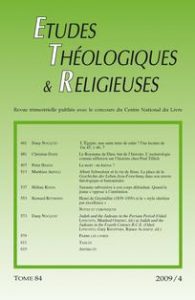L’Égypte est connotée de manière fort négative dans la Bible hébraïque en tant que terre d’oppression et de détresse. Dany Nocquet montre que certains textes nuancent ou contestent cette image de l’Égypte (Ésaïe et le cycle de Joseph dans la Genèse, par exemple). Une approche narrative de Gn 45, 1-46, 7 indique de manière surprenante combien l’Égypte est une nouvelle « terre promise » pour la famille de Jacob, une terre de salut au moment où elle est menacée par la famine. Sur un plan historique, Gn 45, 1-46, 7 est à lire en premier comme un contre-projet à l’Exode et une autre façon de comprendre l’Exil. Expression d’un judaïsme universel et dispersé, ce récit conteste un certain centralisme judéen en légitimant la situation de la communauté juive d’Égypte.
Egypt generally appears as extremely negative in the Hebrew Bible: a land of oppression and distress. In this essay, Dany Nocquet shows that some texts moderate or even deny this image (i.e., Isaiah and the story of Joseph in Genesis). A narrative approach of Gen. 45:1-46:7 highlights the fact that Egypt is a new « Promised Land » for Jacob’s family, a haven at a time of threatening famine. Historically, the story in Gen. 45:1-46:7 should be read first as a counter-project to Exodus and another way of understanding the Exile. This story by giving a legitimate status to the situation of the Jewish community in Egypt both testifies to a universal and dispersed Judaism and challenges a certain Judean centralism.
p. 461-480
Auteur
NOCQUET Dany
Dany NOCQUET est doyen de la Faculté de théologie de Montpellier, où il enseigne l’Ancien Testament et membre du Centre de recherches interdisciplinaires en sciences humaines et sociales (CRISES – EA 4424).
